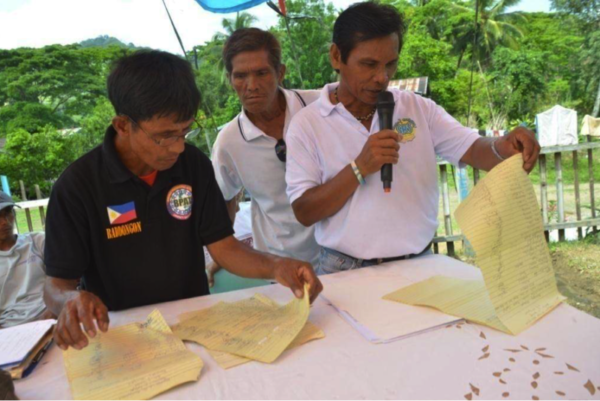
IMPLEMENTING PARTNER: PhilDHRRA-Mindanao
YEARS: 2013-2015
GRANT AMOUNT: $29,931
THEMES: Rule of Law; Local Governance; Gender
The objective of this sub-project was to reduce incidence of Gender-Based Violence in the Province of Agusan del Norte by strengthening capacities of “duty bearers” and empowering women and children “rights holders”. The high rate of gender based violence is due the low prioritization of the issue by the local government agencies; and due to the lack knowledge, skills and attitude on gender sensitivity, leadership, advocacy, planning, budgeting and monitoring and human rights laws (esp. gender-related laws) among women, men and children rights holders, duty bearers and moral bearers.
PhilDHRRA’s analysis indicated that gender based violence was prevalent in the Province of Agusan del Norte mainly due to the following reasons:
- Gender and Development (GAD) budget was not optimally utilized
- Absence of mechanisms for community-based support
- Limited or absence of domestic enabling laws and policies
- Low prioritization of the issue by the local government agencies
- Lack of knowledge and skills on gender sensitivity, leadership, advocacy, planning, budgeting and monitoring and human rights laws among women, men and children rights holders, and duty bearers.
The key approach adopted by the sub-project is the institutionalization of Community-Based Support System (CBSS) that will help prevent and address gender-based violence through capacity enhancement and mobilization of communities (Rights Holders) and support groups (Duty and Moral Bearers).
This was accomplished through the following three activities:
- Capacity Building focused on strengthening capacities of LGUs in institutionalizing gender community-based support. Capacity building targeted women and other victim groups to empower them with knowledge of their rights and entitlements under the law(s) and the mandates and obligations of duty bearers under these laws.
- Developing and enhancing the knowledge, skills and attitude (KSA) of citizens and local government officials on gender sensitivity, leadership, advocacy, gender-sensitive planning and budgeting, monitoring, social accountability and human rights/gender-related laws. These activities aimed at creating an enabling climate for women right holders to play an effective and broad role in local governance.
- Encourage citizen participation in the adoption of gender-related measures and development of the Gender and Development (GAD) plan and budget. This was done to help ensure equitable participation by rural women and men in developing and identifying alternative income generating projects that can be funded by the national and local governments through the Grassroots Participatory Budgeting Process (GPBP).
The project achieved significant results after a year and a half of implementation. Based on the information gathered from focus group discussions conducted in the four pilot barangays, improved knowledge and awareness of GBV and resources for its prevention in the communities actually reduced cases of GBV.
A case study validated that 61 duty bearers were trained on the establishment of CBSS in 4 barangays. After series of capacity building workshops, the duty bearers demonstrated their knowledge by conducting information drives to “puroks”, 4Ps Family Development Sessions, barangay assemblies, and short informal talks in their neighborhood. LIkewise, duty and moral bearers in the four barangays received training and were tapped to run education campaigns in their respective barangays.
Another gain of the project, as shared by the FGD participants, is that they were able to understand Barangay Protection Order (BPO), an order issued to prevent acts of violence against women and grant necessary relief. The relief granted under a protection order serves the purpose of safeguarding the victim from further harm, minimizing disruption in the victim’s daily life, and facilitating the opportunity and ability of the victim to independently regain control over her life.
- Government authority and community recognition of the problem, and a willingness to take part in the solution, helps the project to function smoothly.
- Training, information and education materials and community mobilization events are costly, but important for organizing and operationalizing a Community-Based Support Systems (CBSS). One possible option is to help the community based organizations to acquire legal personality so that they can mobilize funds. Municipal/Provincial Government may also allocate funds for their institutionalization.
- The sub-project achieved significant accomplishments, however, most of the focus group participants indicated a continuing need to further strengthen the CBSS in the pilot areas. They expressed the need for more training and capacity building for the duty bearers so that they can further strengthen their capability to disseminate information to the other “puroks” and even in other barangays.

